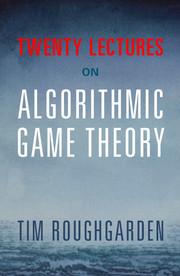Book contents
- Frontmatter
- Dedication
- Contents
- Preface
- 1 Introduction and Examples
- 2 Mechanism Design Basics
- 3 Myerson's Lemma
- 4 Algorithmic Mechanism Design
- 5 Revenue-Maximizing Auctions
- 6 Simple Near-Optimal Auctions
- 7 Multi-Parameter Mechanism Design
- 8 Spectrum Auctions 97
- 9 Mechanism Design with Payment Constraints 113
- 10 Kidney Exchange and Stable Matching
- 11 Selfish Routing and the Price of Anarchy
- 12 Over-Provisioning and Atomic Selfish Routing
- 13 Equilibria: Definitions, Examples, and Existence
- 14 Robust Price-of-Anarchy Bounds in Smooth Games
- 15 Best-Case and Strong Nash Equilibria
- 16 Best-Response Dynamics
- 17 No-Regret Dynamics
- 18 Swap Regret and the Minimax Theorem
- 19 Pure Nash Equilibria and PLS-Completeness
- 20 Mixed Nash Equilibria and PPAD-Completeness
- The Top 10 List
- Hints to Selected Exercises and Problems
- Bibliography
- Index
9 - Mechanism Design with Payment Constraints 113
Published online by Cambridge University Press: 05 August 2016
- Frontmatter
- Dedication
- Contents
- Preface
- 1 Introduction and Examples
- 2 Mechanism Design Basics
- 3 Myerson's Lemma
- 4 Algorithmic Mechanism Design
- 5 Revenue-Maximizing Auctions
- 6 Simple Near-Optimal Auctions
- 7 Multi-Parameter Mechanism Design
- 8 Spectrum Auctions 97
- 9 Mechanism Design with Payment Constraints 113
- 10 Kidney Exchange and Stable Matching
- 11 Selfish Routing and the Price of Anarchy
- 12 Over-Provisioning and Atomic Selfish Routing
- 13 Equilibria: Definitions, Examples, and Existence
- 14 Robust Price-of-Anarchy Bounds in Smooth Games
- 15 Best-Case and Strong Nash Equilibria
- 16 Best-Response Dynamics
- 17 No-Regret Dynamics
- 18 Swap Regret and the Minimax Theorem
- 19 Pure Nash Equilibria and PLS-Completeness
- 20 Mixed Nash Equilibria and PPAD-Completeness
- The Top 10 List
- Hints to Selected Exercises and Problems
- Bibliography
- Index
Summary
Lecture 2 introduced the quasilinear utility model, where each agent acts to maximize her valuation of the chosen outcome, less the pay-ment she makes. We placed no restrictions on payments other than the modest conditions that they are nonnegative and guarantee non-negative utility to truthful bidders. This lecture is the first to consider mechanism design problems with payment constraints, in addition to the usual incentive and feasibility constraints.
Section 9.1 extends the quasilinear utility model to accommodate budget constraints. Section 9.2 studies multi-unit auctions where bidders have budgets, and proposes an elegant if non-DSIC solution: the uniform-price auction. The clinching auction, described in Sec-tion 9.3, is a more complex auction for the same problem that is DSIC. Section 9.4 considers mechanism design with no payments whatsoever, introduces the canonical house allocation problem, and studies the properties of the Top Trading Cycle algorithm.
Budget Constraints
In many applications, there are constraints on the payments charged by a mechanism. Exhibit A is budget constraints, which limit the amount of money that an agent can pay. Budgets are especially relevant in auctions where an agent might buy a large number of items. For example, in the sponsored search auctions (Section 2.6) used in practice, every bidder is asked for her bid-per-click and her daily budget. Per-item values and overall budgets model well how many people make decisions in auctions with lots of items, especially when the items are identical.
Information
- Type
- Chapter
- Information
- Twenty Lectures on Algorithmic Game Theory , pp. 113 - 127Publisher: Cambridge University PressPrint publication year: 2016
